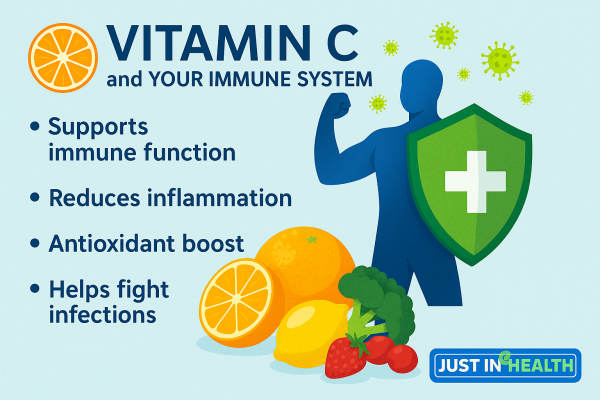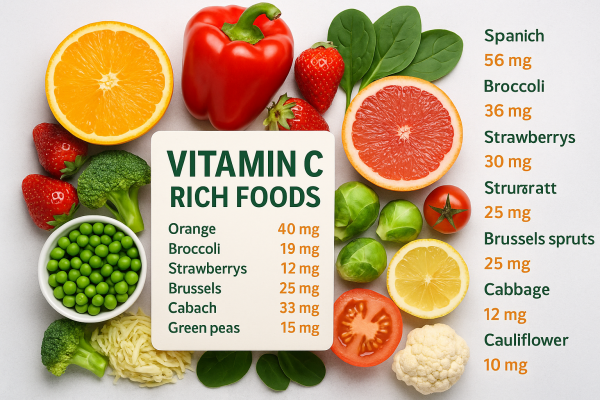

By Dr. Justin Marchegiani
As the seasons shift and viruses circulate, your immune system needs extra support to keep you healthy. Vitamin C, also known as ascorbic acid, is one of the most powerful tools in your natural defense arsenal. Long praised for its role in fighting colds, Vitamin C is far more than just a go-to during flu season—it's a key player in reducing inflammation, enhancing immune cell function, and supporting overall vitality.
Emerging research confirms that individuals with low vitamin C levels may be more susceptible to infections and even experience more severe illness outcomes. So, whether you're looking to prevent illness or recover more quickly, loading up on this super vitamin is smart.
Vitamin C is a water-soluble and powerful antioxidant that helps neutralize free radicals, supports collagen production, boosts nutrient absorption, and fuels your immune system. Regular dietary intake or supplementation is essential since your body can't produce or store it.
In functional medicine, we recognize that vitamin C is integral in supporting white blood cell activity, reducing oxidative stress, and shortening the duration of common infections.

Vitamin C does much more than support your immune health. Here’s a deeper dive into its impressive benefits:
Reduces Duration and Severity of Colds & Flu
Studies show that vitamin C supplementation can reduce the duration of colds by up to 30% in some individuals.
Supports Collagen Synthesis
Essential for healthy skin, joints, and wound healing.
Improves Iron Absorption
Especially from plant-based sources, making it helpful in preventing anemia.
Boosts Brain Function & Memory
Protects neurons from oxidative damage and supports neurotransmitter synthesis.
Lowers Inflammation
Reduces levels of inflammatory markers and supports immune balance.
May Reduce Risk of Chronic Disease
Including heart disease and age-related cognitive decline due to its antioxidant activity.
Shortens Hospital Stays in Viral Pneumonia Cases
High-dose IV vitamin C has shown promise in managing acute respiratory distress syndrome (ARDS).

Whole foods are the best first step. Here are some of the top dietary sources:
Bell peppers
Oranges, grapefruits, lemons
Strawberries
Broccoli
Brussels sprouts
Spinach
Cabbage
Tomatoes
Cauliflower
Green peas
While these foods are great for maintaining baseline levels, therapeutic doses are typically needed when your immune system is under attack.
During increased immune stress (cold, flu, travel, stress), supplementing 2,000 mg 3–4x daily may provide noticeable benefits. Buffered or liposomal forms are often better tolerated and absorbed.
🔗 Click here to see the vitamin C supplement I recommend
A deeper look into your nutrient status may be warranted if you struggle with recurring illness, fatigue, or poor recovery. Functional medicine testing can reveal subclinical vitamin C deficiency, oxidative stress levels, and immune function imbalances. Lab panels like organic acid testing or micronutrient testing can offer insights into:
Ascorbate (Vitamin C) status
Glutathione levels (antioxidant capacity)
Inflammatory markers like CRP and IL-6
Immune cell counts and function
🎯 Click here to schedule a free consult with Dr. J and learn if targeted supplementation is right for you.
Here’s what to do when you feel the first sign of illness:
Vitamin C: 2,000 mg, 3–4x/day
Zinc: 20–30 mg/day to support immune cell activation
Vitamin D3 + K2: 5,000–10,000 IU/day (lab guided)
Herbal Antivirals: Olive leaf, monolaurin, or elderberry
Avoid Sugar, Gluten, and Alcohol: These suppress immune function for hours after consumption
Sleep: Aim for 8–9 hours to allow full immune recovery
Hydration & Electrolytes: Helps mucous membranes function optimally
Vitamin C is one of the safest, most affordable, and most effective ways to boost your immunity, especially when paired with a nutrient-dense diet and healthy lifestyle. Whether trying to prevent illness or speed up recovery, it should be part of your regular health toolkit.
Don’t wait until symptoms hit—build your resilience now.
🧬 Want to test your nutrient levels and get a personalized immune plan?
Schedule your free consult today at www.justinhealth.com/free-consult
References:
Hemilä, H. (2017). Vitamin C and infections. Nutrients, 9(4), 339. https://www.ncbi.nlm.nih.gov/pmc/articles/PMC5409678/
Carr, A.C., & Maggini, S. (2017). Vitamin C and Immune Function. Nutrients, 9(11), 1211. https://www.ncbi.nlm.nih.gov/pmc/articles/PMC5707683/
Fowler AA et al. (2019). High-dose intravenous vitamin C in patients with sepsis and severe acute respiratory failure. JAMA. https://clinicaltrials.gov/ct2/show/NCT04264533
NIH Office of Dietary Supplements. (2022). Vitamin C Fact Sheet for Health Professionals.
https://ods.od.nih.gov/factsheets/VitaminC-HealthProfessional/
====================
Recommended Product
====================
IN CASE YOU MISSED IT:
Unlocking the Power of N-Acetylcysteine (NAC): Top Health Benefits & How to Personalize It
Why are people in the USA so sick, and what to do about it with Rob Edwards| Podcast #440